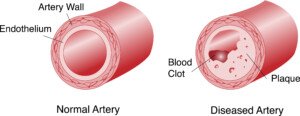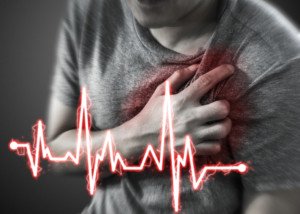
If your stress test was normal, does this mean you can’t possibly have severely blocked coronary arteries?
How much faith should you put in the cardiac stress test?
“A stress echocardiogram or a nuclear stress test are each about 90 percent accurate in correctly identifying a severe coronary blockage, i.e., at least one of the coronary arteries has a narrowing greater than 70 percent).,” explains Dr. Larry Santora, MD, a cardiologist with Orange County Heart Institute and Research Center, and author of “OC Cure for Heart Disease.”
“However about 10 percent of the time it will miss the blockage, and the stress test will be ‘falsely negative’,” explains Dr. Santora.
“These false negative stress tests are more common in women.
“It is more common to have a false negative if the blockage is in the circumflex artery which, on the back side of the heart, is more likely to be missed since it tends to be a smaller artery, and rarely, even if all three arteries are equally blocked (called ‘balanced ischemia’).”
The possibility of false negatives got me wondering, then, about someone with a high coronary calcium score who has a normal stress test.
They may worry that they might be in that 10 percent in which the test results are not accurate.
Dr. Santora explains, “There is no test in medicine that is 100 percent accurate; not a mammogram or colonoscopy, etc.
“If you have a high coronary calcium score and you are asymptomatic (no chest pain), and your stress test is normal, the probability of a severe blockage (meaning a narrowing more than 70 percent in one of the major coronaries) at that time is very, very low.
“If the patient had symptoms, even if the stress test is normal, then the chance of a severe blockage is perhaps 25 percent, and another test is needed, maybe a CT angiogram.”
The CTA will reveal amount of soft plaque versus hard (stabilized) plaque.
Soft plaque can rupture and block an artery.

Shutterstock/OSweetNature
“Anyway, it is the CAC that tells you if you need an aggressive approach to lower cholesterol and other risk factors,” says Dr. Santora.
So if you had a high coronary calcium score and normal stress test, this does not excuse you from taking aggressive measures to improve the state of your coronary arteries.
“The high coronary calcium score tells you that you must take aggressive risk reduction measures,” continues Dr. Santora.
“You cannot put full faith in a stress test. But some 90 percent blockages in the more distal ends (towards the end of the artery) can be treated without surgery or a stent, with risk modification.
“In these there can be plaque stabilization or some reversal, and the development of collaterals; that is, new arteries grow from a normal coronary over to the artery that is blocked.
“This can be promoted by exercise and external counterpulsation.”
If one’s coronary calcium score is deemed too high to allow a CTA image to be read (usually over 800), then Dr. Santora says, “You can still feel comfortable if you have no symptoms and a normal stress test, with vigorous risk modification.”
Modification would mean exercise, change in diet (e.g., severe restriction of refined carbohydrates and sugars, as well as saturated and trans fats), supplements and perhaps a pharmaceutical agent.
If the stress test is not clear, and you have a very high CAC, “then do an invasive cardiac catheterization and coronary angiogram,” says Dr. Santora.

Dr. Santora’s areas of interest include interventional cardiology – coronary stenting; cardiac CT – CT angiography, and coronary calcium screening with EBCT. He is board certified in cardiovascular disease and internal medicine.
 Lorra Garrick has been covering medical, fitness and cybersecurity topics for many years, having written thousands of articles for print magazines and websites, including as a ghostwriter. She’s also a former ACE-certified personal trainer.
Lorra Garrick has been covering medical, fitness and cybersecurity topics for many years, having written thousands of articles for print magazines and websites, including as a ghostwriter. She’s also a former ACE-certified personal trainer.









































